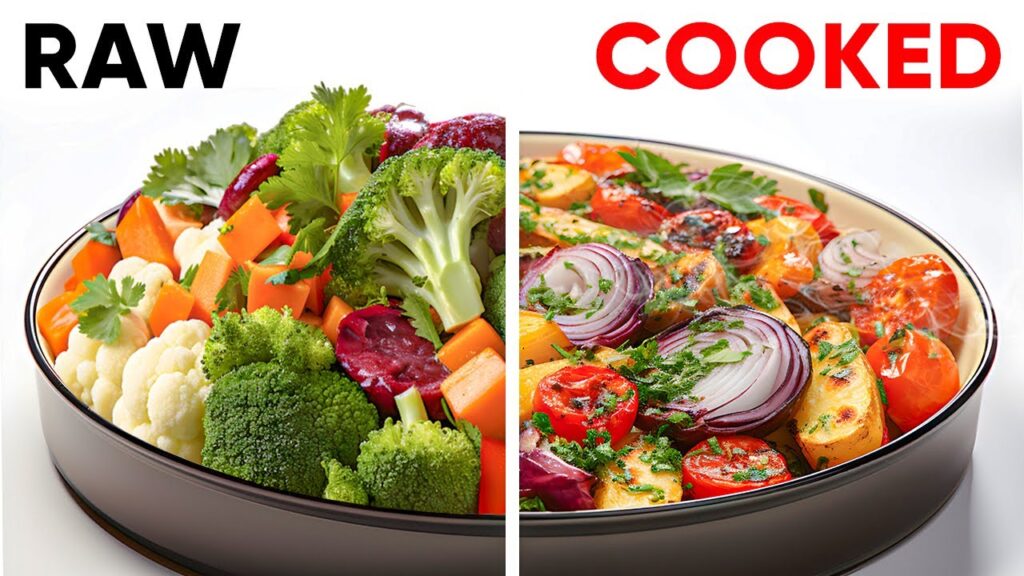The Great Debate: Raw vs Cooked – Which is Better for Your Health?
by siteadmin

In the culinary world, there’s an age-old debate that continues to spark conversation and divide opinions: raw versus cooked foods. Whether you’re a devoted raw food enthusiast or a die-hard cooking aficionado, the choice between raw and cooked foods often goes beyond personal preference; it delves into the realms of nutrition, taste, and even safety. So, let’s dive into the heart of this debate and explore the pros and cons of both raw and cooked foods.
Raw Foods:
For proponents of raw foods, the philosophy is simple: consuming foods in their natural, uncooked state preserves their nutritional integrity and maximizes their health benefits. Raw foodists argue that cooking can destroy enzymes, vitamins, and other micronutrients present in foods, leading to a loss of nutritional value. Additionally, raw foods are believed to be easier to digest, leading to better absorption of nutrients and improved gut health.
Raw food diets typically consist of fruits, vegetables, nuts, seeds, and sprouted grains. Advocates of raw diets often tout benefits such as increased energy levels, clearer skin, and weight loss. However, it’s essential to note that raw diets require careful planning to ensure adequate intake of essential nutrients such as protein, calcium, and vitamin B12, which may be lacking in a predominantly raw food diet.
Cooked Foods:
On the other side of the spectrum, cooking has been a fundamental aspect of human evolution and culture for thousands of years. Cooking not only enhances the flavor and texture of foods but also plays a crucial role in food safety by killing harmful bacteria and pathogens. Additionally, cooking can break down tough fibers and cell walls in plant foods, making nutrients more accessible for absorption.
Cooked foods offer a wide range of culinary possibilities, from roasting and grilling to steaming and sautéing. Cooking can enhance the taste and aroma of foods, making them more palatable and satisfying. Moreover, certain cooking methods, such as steaming and boiling, can help retain water-soluble vitamins like vitamin C and B vitamins, despite some loss of heat-sensitive nutrients during the cooking process.
Finding Balance:
While the debate between raw and cooked foods may seem like an either-or proposition, the truth lies somewhere in between. Both raw and cooked foods have their unique benefits, and incorporating a variety of both into your diet can provide a well-rounded approach to nutrition and health.
For instance, enjoying a colorful salad with raw vegetables can provide an array of vitamins, minerals, and antioxidants, while incorporating cooked foods like roasted sweet potatoes or sautéed greens can add depth of flavor and texture to your meals. By striking a balance between raw and cooked foods, you can harness the benefits of both while enjoying a diverse and satisfying diet.
In the end, whether you prefer raw or cooked foods, what matters most is making informed choices that align with your individual preferences, nutritional needs, and health goals. While raw foods may offer certain advantages in terms of preserving nutrients and supporting digestion, cooked foods can provide enhanced flavors, improved food safety, and increased culinary diversity.
Ultimately, a balanced approach that incorporates a variety of fresh, whole foods—both raw and cooked—will likely yield the most significant benefits for overall health and well-being. So, whether you’re whipping up a colorful salad or simmering a hearty stew, embrace the diversity of raw and cooked foods, and savor the delicious journey to optimal health.
In the culinary world, there’s an age-old debate that continues to spark conversation and divide opinions: raw versus cooked foods. Whether you’re a devoted raw food enthusiast or a die-hard cooking aficionado, the choice between raw and cooked foods often goes beyond personal preference; it delves into the realms of nutrition, taste, and even safety.…
Recent Posts
- Maximizing Health: Optimizing Vitamin Intake Through Diet
- Unlocking the Power of Vitamins: Understanding Their Functions and Benefits
- Nourishing Your Body: A Culinary Journey with Healthy Recipes
- Nourishing Your Body: The Power of Nutrition
- The Great Debate: Raw vs Cooked – Which is Better for Your Health?
